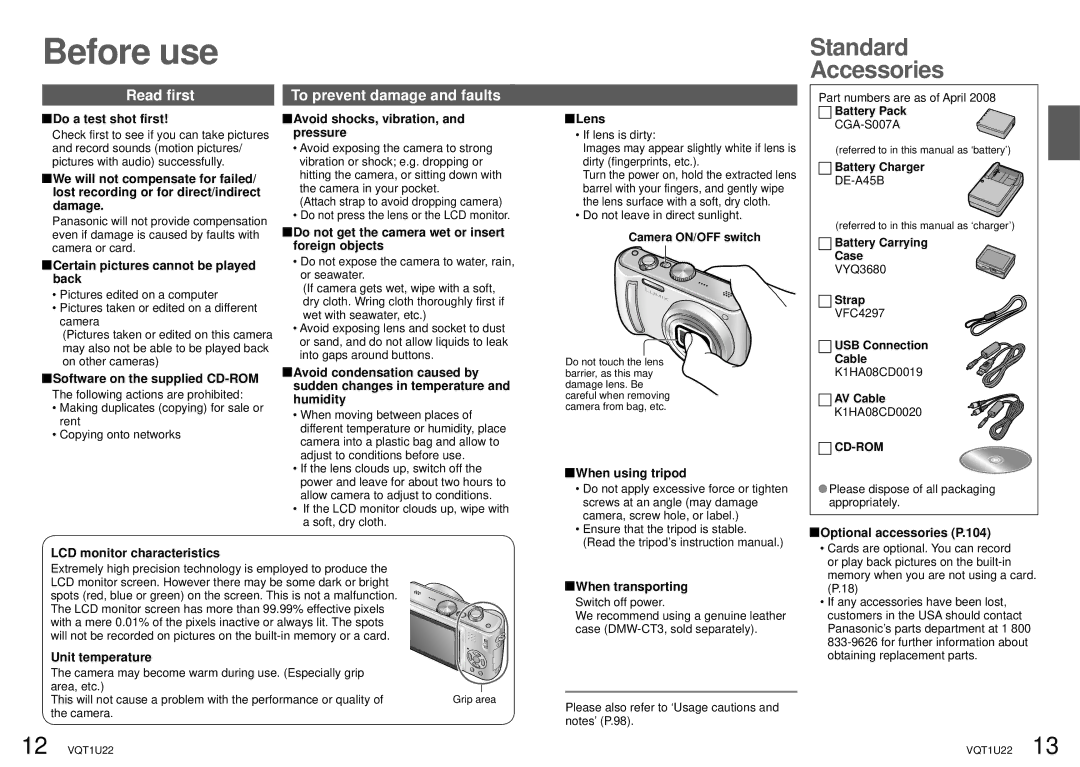
Before use
Standard Accessories
Read first
 Do a test shot first!
Do a test shot first!
Check first to see if you can take pictures and record sounds (motion pictures/ pictures with audio) successfully.
![]() We will not compensate for failed/ lost recording or for direct/indirect damage.
We will not compensate for failed/ lost recording or for direct/indirect damage.
Panasonic will not provide compensation even if damage is caused by faults with camera or card.
 Certain pictures cannot be played back
Certain pictures cannot be played back
•Pictures edited on a computer
•Pictures taken or edited on a different camera
(Pictures taken or edited on this camera may also not be able to be played back on other cameras)
 Software on the supplied
Software on the supplied CD-ROM
The following actions are prohibited:
•Making duplicates (copying) for sale or rent
•Copying onto networks
To prevent damage and faults
 Avoid shocks, vibration, and pressure
Avoid shocks, vibration, and pressure
•Avoid exposing the camera to strong vibration or shock; e.g. dropping or hitting the camera, or sitting down with the camera in your pocket.
(Attach strap to avoid dropping camera)
•Do not press the lens or the LCD monitor.
 Do not get the camera wet or insert foreign objects
Do not get the camera wet or insert foreign objects
•Do not expose the camera to water, rain, or seawater.
(If camera gets wet, wipe with a soft, dry cloth. Wring cloth thoroughly first if wet with seawater, etc.)
•Avoid exposing lens and socket to dust or sand, and do not allow liquids to leak into gaps around buttons.
![]() Avoid condensation caused by sudden changes in temperature and humidity
Avoid condensation caused by sudden changes in temperature and humidity
•When moving between places of different temperature or humidity, place camera into a plastic bag and allow to adjust to conditions before use.
•If the lens clouds up, switch off the power and leave for about two hours to allow camera to adjust to conditions.
•If the LCD monitor clouds up, wipe with a soft, dry cloth.
 Lens
Lens
•If lens is dirty:
Images may appear slightly white if lens is dirty (fingerprints, etc.).
Turn the power on, hold the extracted lens barrel with your fingers, and gently wipe the lens surface with a soft, dry cloth.
•Do not leave in direct sunlight.
Camera ON/OFF switch
Do not touch the lens ![]() barrier, as this may damage lens. Be
barrier, as this may damage lens. Be
careful when removing camera from bag, etc.
 When using tripod
When using tripod
• Do not apply excessive force or tighten |
screws at an angle (may damage |
camera, screw hole, or label.) |
• Ensure that the tripod is stable. |
(Read the tripod’s instruction manual.) |
Part numbers are as of April 2008
Battery Pack
(referred to in this manual as ‘battery’)
Battery Charger
(referred to in this manual as ‘charger’)
![]()
![]() Battery Carrying
Battery Carrying
Case
VYQ3680
Strap
VFC4297
![]()
![]() USB Connection
USB Connection
Cable
K1HA08CD0019
AV Cable
K1HA08CD0020


CD-ROM
![]() Please dispose of all packaging appropriately.
Please dispose of all packaging appropriately.
 Optional accessories (P.104)
Optional accessories (P.104)
LCD monitor characteristics
Extremely high precision technology is employed to produce the LCD monitor screen. However there may be some dark or bright spots (red, blue or green) on the screen. This is not a malfunction. The LCD monitor screen has more than 99.99% effective pixels with a mere 0.01% of the pixels inactive or always lit. The spots will not be recorded on pictures on the
Unit temperature
The camera may become warm during use. (Especially grip |
|
area, etc.) |
|
This will not cause a problem with the performance or quality of | Grip area |
the camera. |
|
 When transporting
When transporting
Switch off power.
We recommend using a genuine leather case
Please also refer to ‘Usage cautions and notes’ (P.98).
•Cards are optional. You can record or play back pictures on the
•If any accessories have been lost, customers in the USA should contact Panasonic’s parts department at 1 800
12 VQT1U22 | VQT1U22 13 |
